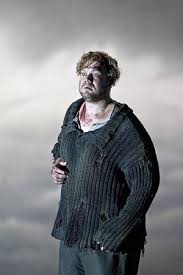London Philharmonic Orchestra, Vladimir Jurowski, Birmingham Symphony Hall
26 September 2013
What better way to open the new season in Birmingham than with an anniversary performance of a work which was to change the face of British opera when it was first performed in 1945.
Having given us a riveting account of Billy Budd at Glyndebourne earlier this summer, Vladimir Jurowski now brought us an impassioned and hard driven Peter Grimes in the glorious acoustic of Birmingham Symphony Hall.
Many semi-staged performances are little more than a trail of singers on and off the platform but Daniel Slater’s approach was far more dynamic. The chorus (London Voices) act and react throughout, moving position behind the orchestra, breaking into groups and, for the massive out-pouring at the end of the man-hunt, moving right to the front of the platform. Soloists were equally involved, singing from memory and inter-acting with conviction. Clothing may have been modern but was accurate to character and emotional impact. I can’t recall an Ellen Orford who looked so obviously a primary school teacher.
All of this would have been of little account had not the musical impact been equally impressive. Vladimir Jurowski drives the score with an intensity which does not let up. The storm is released with unexpected passion and power, and at a speed which left one breathless. The combination of physical and psychological unravelling was carried over into the more introspective moments, making them all the more fragile.
Cast from strength, there were no weaknesses in the ensemble. The approach of both conductor and director seemed to highlight the sheer nastiness of Borough society in the face of a troubled outsider. Stuart Skelton’s Grimes is unusually sensitive. His phrasing of Three days in the opening scene and later alone .. alone when describing the boy’s death to Balstrode, gave us an insight into Grimes’ character which was elaborated in the transcendent performance of When the Great Bear..
Pamela Armstrong’s Ellen was the troubled bridge between the Borough and Grimes, strong enough to stand up to the bullies but unable, in the long run, to save Grimes from them. She often allowed her solo singing to become unexpectedly romantic, and one could sense the impact of late Puccini on Britten’s writing – something I had not noticed before.
Alan Opie’s troubled Balstrode and Brindley Sherratt’s all too human Swallow led the Borough characters, none of whom were caricatured, making the social grouping all the more unpleasant.
Having the orchestra so exposed allowed the interludes to speak with greater authority, and without the usual coughs and squeaks which we get in the opera house. Woodwind seemed particularly edgy and acidic, making the sea a more dangerous and threatening place – a force as ominous as the folk of the Borough.
The performance was not being recorded – a pity for this was one of the most enthralling Grimes that I can recall.
And a footnote: given that this was the first night of the international season, and one of the finest casts available for a key work in the Britten anniversary season – where were the audience? I know there is a lot going on in Birmingham at present but the number of empty seats was disappointing. BH







